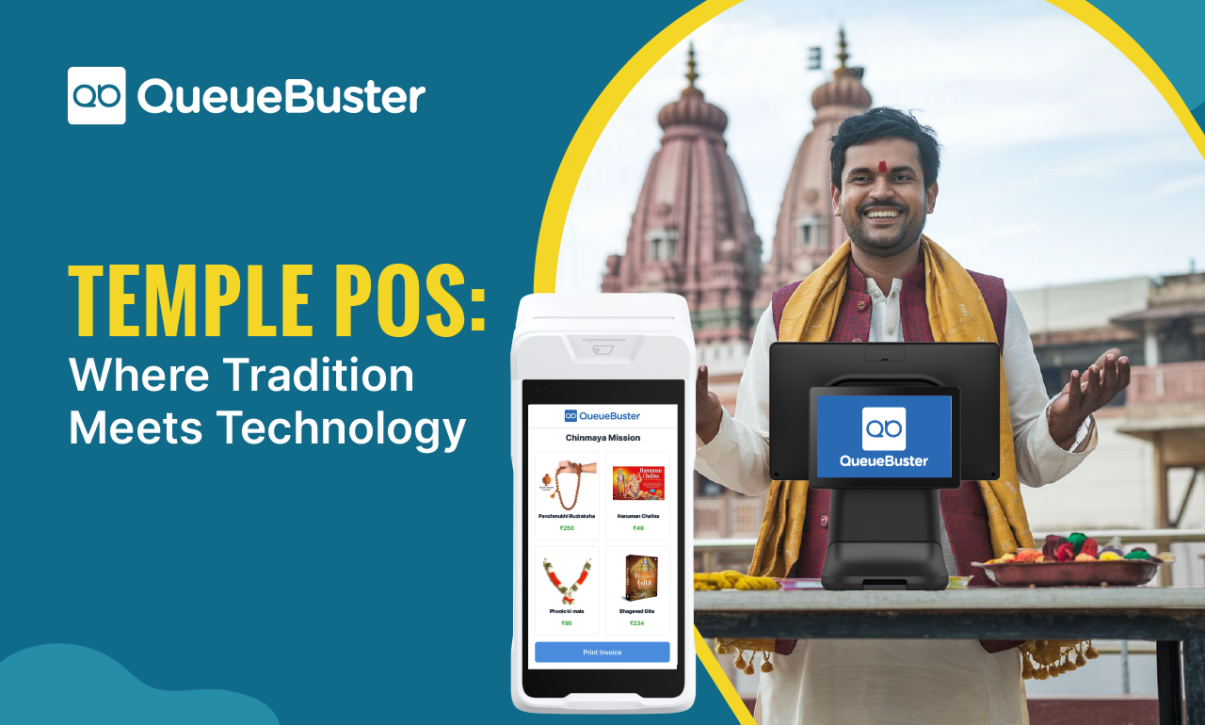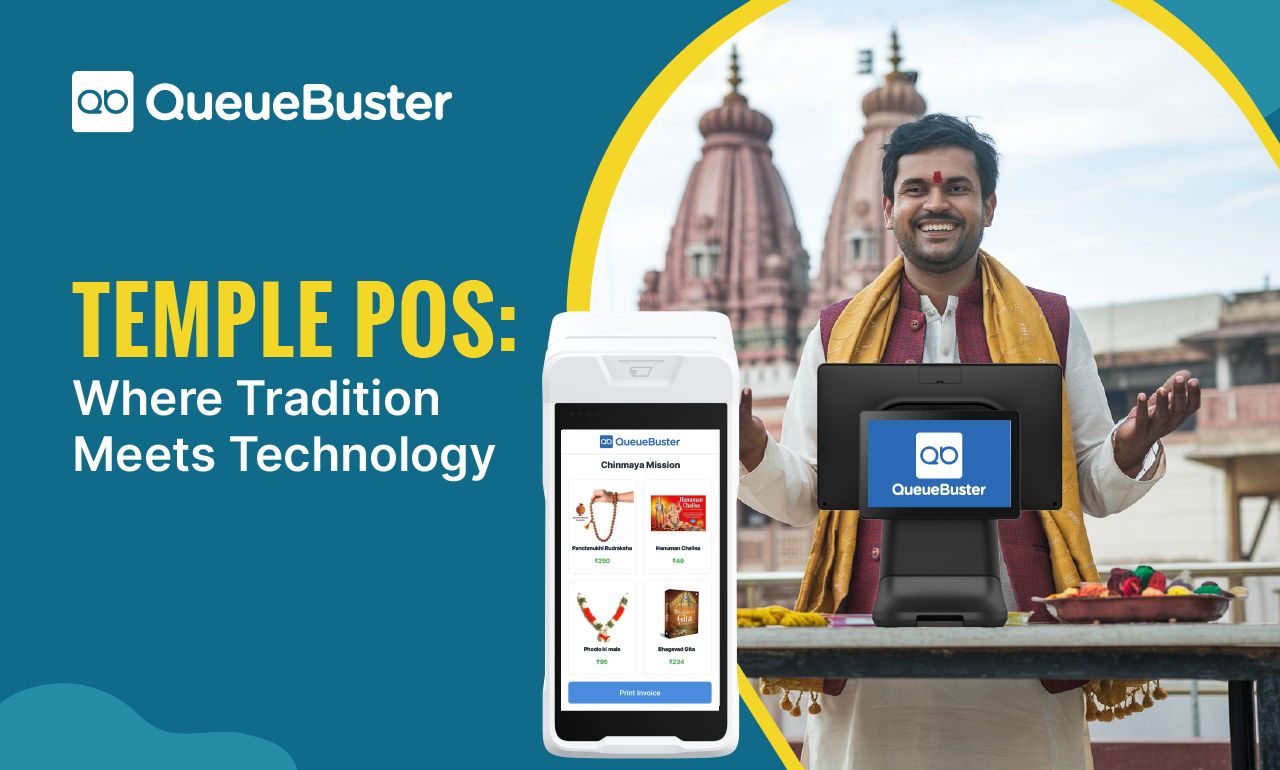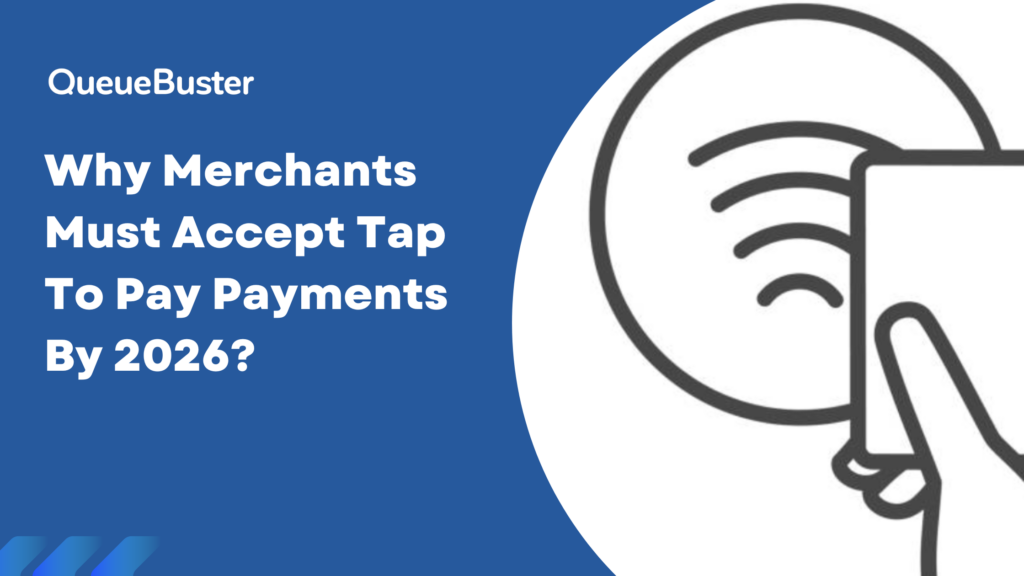
Temple POS: Where Tradition Meets Technology
Temple POS: Where Tradition Meets Technology

By QueueBuster Team Published: September 5th, 2024
In a world where technology is part and parcel of our daily life, even the most religious of places- the temples-also enjoin with technology. Management at temples has conventionally been very labour-intensive, right from collecting donations, managing inventory to organizing events.
However, all that has become possible with advanced systems like QueueBuster Temple POS for point-of-sale, and the temples can spend more time on spiritual missions rather than mundane record-keeping.
In this article, a short tour will be provided on how to implement and use POS billing software in temples and discuss reasons why QueueBuster Temple POS stands out as the best option for temple management.
How to Use the Temple POS at Religious Centres Effectively?
1. Need to Understand the Requirement of POS in Temples
Historically, temples have been custodians of enormous resources, both material and financial. The management of such resources has always been a formidable challenge. Nowadays, due to the increasing footfall and complexity in the operation of the temples, traditional modes of management fall woefully short. That’s where POS systems come in.
A temple POS system will enable the management of varied activities related to temple administration at a single point, which is donations, inventory, event registrations, or accounting. Automating these processes thus allows temples to reduce manual errors, saves time, and brings full transparency and accountability.

2. Setting Up and Configuring Your Temple POS System
The way to begin the implementation of the point-of-sale system in your temple is to select one that precisely fits your needs. An example could be QueueBuster Temple POS, which is designed with the particular challenges that a Temple Management would face.
When The Chosen System is Set Up and Configured, Here’s How you Get Started with The Implementation:
A. Integration with Existing Systems:
Most temples are already on various software related to accounting, CRM, and online services. It is very important that your POS system integrates with these existing systems. What this means is seamless data exchange between platforms, reducing the chances of discrepancies and bringing more cohesion in management.
B. Testing the Setup:
Test the system adequately before it goes live. Make mock transactions, as would normally occur in the course of business, to ensure all transaction types are processed correctly by the system. This is also an opportune time to make whatever adjustments it seems do not work the way one would want.
C. Customization of the Point-of-Sale System:
POS needs to be integrated with the different transactions happening at a temple. This may include setting up different payment modes, including cash, card, and mobile; managing donations; inventory tracking of prasad, flowers, or religious artifacts; event registration; etc.

3. Training and Implementation
Even the most up-to-date POS system is only as effective as those who will use it. Because of this, training is an extremely important aspect of a successful setup.
a. Training of Staff and Volunteers:
The training of all the temple staff and volunteers who will come into contact with the POS system is very important. Training on donation processing, inventory management, event registration, and report generation is necessary. Temples usually rely on volunteers, and most of them may not necessarily be tech-savvy, so the training must be extensive but simple.
b. Training and Updates:
Technology is ever-evolving, and so are POS systems. In the event of updates or the addition of new features, ongoing training sessions are recommended for staff and volunteers. Refresher courses would also help in reinforcing best practices in efficiently using the system.
c. Implementation Strategy:
For the application of the POS system, consider a step-by-step manner. Have the system go through piloting whereby it is deployed to a small set of operations. This shall help in understanding and weeding out all issues regarding operation before scaling this up for all Temple activities.
4. Integration with Existing Systems
Easy integration with present systems is one of the most important characteristics of a good POS system, including QueueBuster Temple POS.
a. Accounting Integration:
Accounting software integration with a POS system ensures that all the financial transactions are recorded in your financial statements automatically. This reduces manual entries, hence minimizing errors.
b. CRM Integration:
Integrating the POS system will help update the records for those temples using any CRM system to track the relationships with devotees and donors. For instance, when a donation is given to the temple, a CRM system automatically updates information about the donors, hence making it easy to target them personally later on.
c. Online Marketplace Integration:
Many temples sell books, idols, or prasad on their religious websites and other online marketplaces. Integration with such a website will synchronize inventory and sales data in order to keep the online store updated automatically.
5. Ongoing Maintenance and Support
No technology is infallible, and neither are POS systems. Yes, the POS system does require routine maintenance for seamless functioning.
a. Software Updates:
The POS software regularly undergoes updates to eliminate bugs, enhance its safety features, and to continuously improve its capabilities. Keep your system updated with the latest version at all times.
b. Technical Support:
Reliable customer support is a must. QueueBuster Temple POS has the privilege of availing itself of dedicated support services regarding issues that may arise. This support could very well mean the difference between quick problem-solving and costly downtime in temple operations.
c. Data Backup:
Back up your data on a regular basis, which would not get lost in case of a technical failure or any other problem. This can be made possible by using automated backup solutions in order to keep all your valuable data in safe hands.
Read other blog posts too:
What Is a POS System and How Does Modern POS Software Work?
Seven Factors in Choosing the Best POS Software
Why Your Business Needs an All In One POS Billing Software
Why QueueBuster Temple Management Software is the Best Choice?
Having discussed the general aspects of a POS system and its usage in temples, now it will be great to show the features that make QueueBuster Temple POS the best among all in temple management softwares.

a. All-Inclusive Features:
The QueueBuster Temple management software is fully equipped to meet the special needs and purposes of a temple. This system will take care of donation management, inventory control, event management, and a lot more. For this reason, it is one-stop buying for all sorts of temple requirements because several means of paying for goods are available, with automatic generation of receipts and constant updating of the inventory.
b. User-Friendly Interface:
Among various challenges of new technology adoption, one of the big issues is to get people to use it effectively. QueueBuster Temple POS addresses this with an intuitive interface-user-friendly to a degree that requires minimal training. Volunteers with very limited technical backgrounds can get right into the system.
c. Integration Capabilities:
QueueBuster Temple POS integrates with various software systems, including accounting software, CRM software, and online marketplaces, to function effectively. This keeps all aspects of temple management updated and unified in handling temple operations smoothly.
d. Proven Track Record:
QueueBuster Temple POS is not mere theory but has been applied in famous temples like Tirupati Balaji Temple and Siddhivinayak Mandir. Since the introduction of QueueBuster POS, the temples have seen immense improvement in efficiency and transparency, thus proving to be reliable and effective.
e. Reliable Support:
QueueBuster has reliable customer support. From minor inquiries to major issues, their support team is always ready to help. This ensures seamless operation of the POS system and allows the temple administrators to attend to their core spiritual duties.
The Takeout
The integration of any POS into the daily running of your temple, like QueueBuster, allows for a reinvention not only in donation management, inventory, and events but has also been crafted with the objective of enhancing efficiency and bringing transparency and accountability throughout. Equipped with all-encompassing features, ease of use, and a proven track record, QueueBuster Temple POS is an outstanding choice for any religious institution keen on refreshing its operations while being true to its spiritual mission.
In other words, embracing technology would not only enable the temples to deal with their resources in a better way but also bring greater experience for devotees and better equip them on their spiritual journeys.
Popular Posts

MEWA India 2026: Showcasing QueueBuster POS to the Global Dry Fruits Industry
MEWA India 2026 was not just another industry event for us, it […]

Why Merchants Must Accept Tap to Pay Payments by 2026
The way customers pay has changed rapidly over the last few years […]